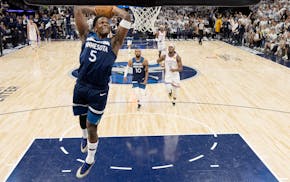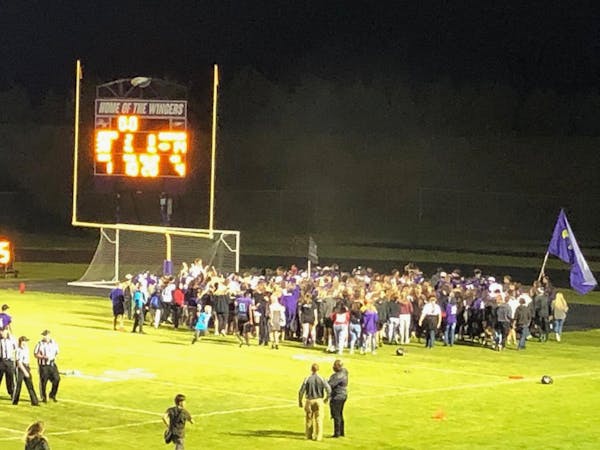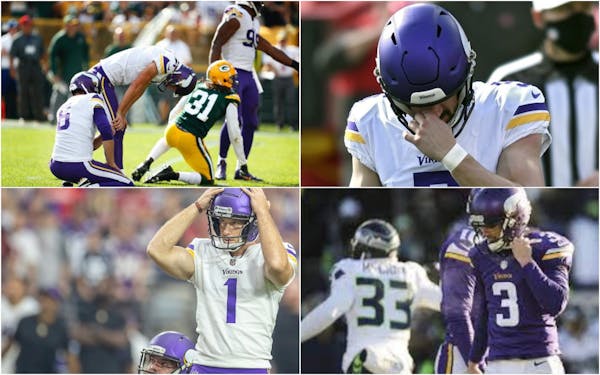The Vikings fan blaming losses on missed field goals is like a New Orleans resident blaming floods on a leaky faucet.
Kickers aren't the Vikings' problem.
Kickers are the Vikings' toupee.
When Greg Joseph missed a 37-yard field goal as time ran out in the Vikings' 34-33 loss at Arizona on Sunday, he joined a pantheon of kickers who failed to deliver a victory in the clutch.
Joseph failed in that moment. That's a fact. What's worse than him failing is him becoming a symbol of the Vikings' failures, letting more important and higher-paid employees off the hook.
We've seen this before. Gary Anderson did not miss a field goal in 1998 until the NFC Championship Game. He, too, became a symbol of that team's failures, obscuring mistakes made by actual football players.
When Anderson missed that field goal, he helped fans forget that Robert Smith ran out of bounds when trying to kill the clock, and that Randall Cunningham held the ball too long on a strip sack that changed the game, and that Randy Moss seemed to lose interest, and that the defense was shredded by injuries and couldn't stop the run or hassle a non-legendary quarterback in Chris Chandler, or that Denny Green had Cunningham take a knee at the end of regulation even though explosiveness and creativity was their greatest strength and Atlanta's defense was hurting.
But, sure, blame the kicker for missing one field goal.
Similarly, Joseph's loss obscured other failures.
The Vikings were running at will. Kirk Cousins had been efficient and had not turned the ball over all game — and still hasn't turned over the ball all season.
The Vikings offensive line was having a great day in the running game and had improved vastly over Week 1 in pass blocking. The Vikings have two star receivers to go with their all-world running back.
So why did coach Mike Zimmer run about 40 seconds off the clock and settle for a 37-yard-field goal from an inexperienced kicker? An experienced quarterback and star running back might have scored a touchdown, or made the field goal a chip shot.
Cousins' stat line is gaudy, but in a game in which he had the advantage of a great running game and good protection, he produced three offensive points in the second half.
Justin Jefferson, the wonderful second-year receiver, dropped a long Cousins pass down the sideline.
The Vikings' defense, even with Danielle Hunter playing like his old self, allowed 34 points.
But, sure, blame the kicker.
In sports as in politics and business, always follow the money.
The Vikings have decided to pay a lot of talented players a lot of money, and they have routinely overspent in relation to production.
Anthony Barr may be a good player, but he was a bad signing. This is the second season in a row in which his injury replacement — Eric Wilson in 2020 and Nick Vigil this year — has made more pivotal plays than we're accustomed to Barr making.
Harrison Smith just signed another big deal, and he is making few pivotal plays.
Then there is Cousins, The Illusionist. He is one of the highest-paid quarterbacks in the league. He is surrounded with skill position talent. Sunday, his offensive line played well. He produced zero offensive touchdowns in the second half of a wide-open game.
His record in Washington: 26-30-1. His record in Minnesota, starting with a season that followed a 13-3 Vikings season: 25-23-1. Career record: 51-53-2. That's what the Vikings are paying $33 million a year for.
Star players are on the field for 50 to 70 plays a game. Coaches spend all week devising schemes and plays and make hundreds of decisions during the game. Kickers jog onto the field and swing their leg a few times a game.
There is a cure for this problem: Deemphasize kicking.
There is no way a field goal should be half as valuable as a touchdown. There is no way an extra point should be half as valuable as a two-point attempt.
Kicking should be a desperate, end-of-half, tiebreaking stratagem, not an accepted feature of modern football.
But then Vikings fans would have to blame their favorite players, not their kicking temp, when they lose.

Souhan: If Edwards is a franchise player, he needs to act and play like it
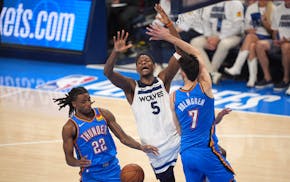
Souhan: Wolves' weak performance in Game 5 invites change, so don't let it shock you
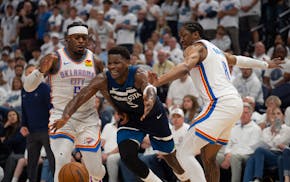
Souhan: Edwards and Randle flop in the Timberwolves' biggest game of the season
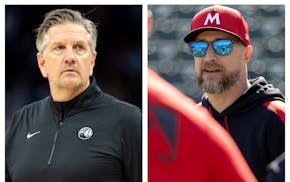
Souhan: Twins' Baldelli and Timberwolves' Finch have a lot in common. They ought to talk.
